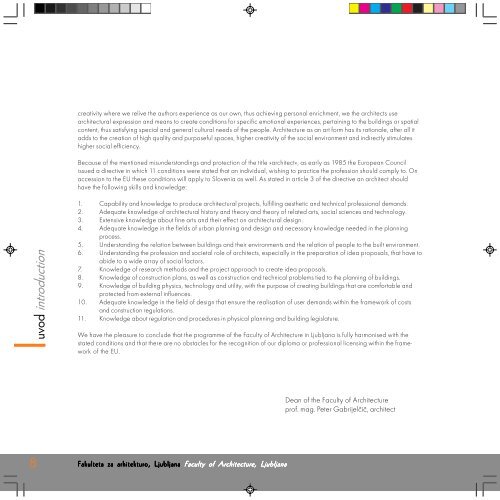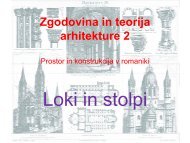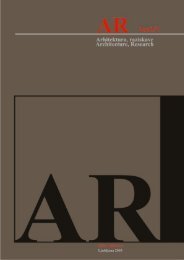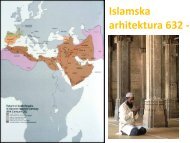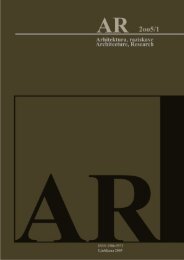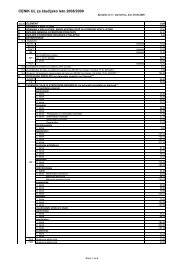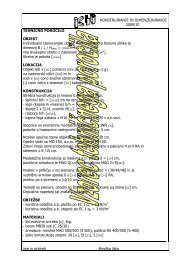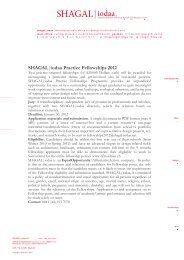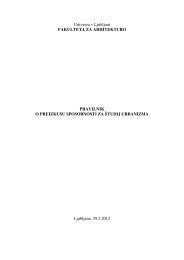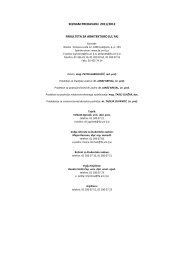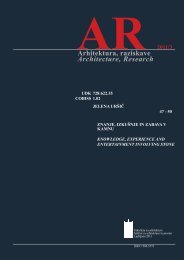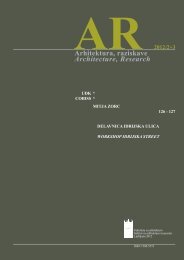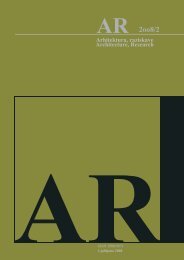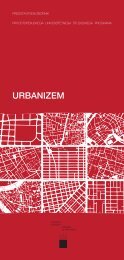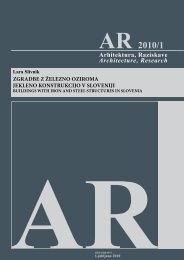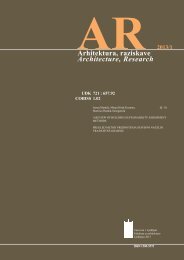VeÄ - Fakulteta za arhitekturo - Univerza v Ljubljani
VeÄ - Fakulteta za arhitekturo - Univerza v Ljubljani
VeÄ - Fakulteta za arhitekturo - Univerza v Ljubljani
You also want an ePaper? Increase the reach of your titles
YUMPU automatically turns print PDFs into web optimized ePapers that Google loves.
creativity where we relive the authors experience as our own, thus achieving personal enrichment, we the architects use<br />
architectural expression and means to create conditions for specific emotional experiences, pertaining to the buildings or spatial<br />
content, thus satisfying special and general cultural needs of the people. Architecture as an art form has its rationale, after all it<br />
adds to the creation of high quality and purposeful spaces, higher creativity of the social environment and indirectly stimulates<br />
higher social efficiency.<br />
Because of the mentioned misunderstandings and protection of the title »architect«, as early as 1985 the European Council<br />
issued a directive in which 11 conditions were stated that an individual, wishing to practice the profession should comply to. On<br />
accession to the EU these conditions will apply to Slovenia as well. As stated in article 3 of the directive an architect should<br />
have the following skills and knowledge:<br />
uvod introduction<br />
1. Capability and knowledge to produce architectural projects, fulfilling aesthetic and technical professional demands.<br />
2. Adequate knowledge of architectural history and theory and theory of related arts, social sciences and technology.<br />
3. Extensive knowledge about fine arts and their effect on architectural design.<br />
4. Adequate knowledge in the fields of urban planning and design and necessary knowledge needed in the planning<br />
process.<br />
5. Understanding the relation between buildings and their environments and the relation of people to the built environment.<br />
6. Understanding the profession and societal role of architects, especially in the preparation of idea proposals, that have to<br />
abide to a wide array of social factors.<br />
7. Knowledge of research methods and the project approach to create idea proposals.<br />
8. Knowledge of construction plans, as well as construction and technical problems tied to the planning of buildings.<br />
9. Knowledge of building physics, technology and utility, with the purpose of creating buildings that are comfortable and<br />
protected from external influences.<br />
10. Adequate knowledge in the field of design that ensure the realisation of user demands within the framework of costs<br />
and construction regulations.<br />
11. Knowledge about regulation and procedures in physical planning and building legislature.<br />
We have the pleasure to conclude that the programme of the Faculty of Architecture in Ljubljana is fully harmonised with the<br />
stated conditions and that there are no obstacles for the recognition of our diploma or professional licensing within the framework<br />
of the EU.<br />
Dean of the Faculty of Architecture<br />
prof. mag. Peter Gabrijelèiè, architect<br />
8 <strong>Fakulteta</strong> <strong>za</strong> <strong>arhitekturo</strong>, Ljubljana Faculty of Architecture, Ljubljana


